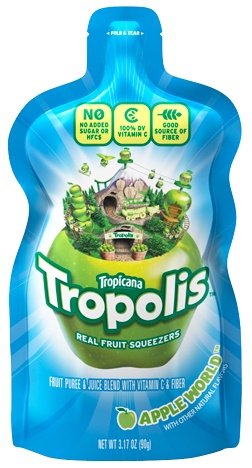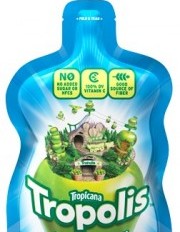 The new Tropicana AppleWorld Tropolis snack.Americans know fruits and vegetables are good for us, but still, only a pathetic portion of adults actually eat them every day. It’s pretty tough to foist things on your kids that you yourself don’t eat, which might explain why one out of five U.S. children is obese.
The new Tropicana AppleWorld Tropolis snack.Americans know fruits and vegetables are good for us, but still, only a pathetic portion of adults actually eat them every day. It’s pretty tough to foist things on your kids that you yourself don’t eat, which might explain why one out of five U.S. children is obese.
PepsiCo is here to help. The solution? Make fruit more fun! And what’s more fun than puréed slush in a tube that you can hand your kid in his carseat to squirt in his mouth?
Move over, juice boxes and Go-Gurt: PepsiCo subsidiary Tropicana is introducing Tropolis “portable kids’ snacks” in select Midwest markets this month. Now, to be fair, the CherryWorld, GrapeWorld and AppleWorld pouches are at least filled with actual fruit, with no added sugars, high fructose corn syrup or other artificial sweeteners, or artificial flavors, colors or preservatives. That’s something. But really, aren’t apples and grapes already pretty portable snacks that’s “designed to fit in lunchboxes and small hands”? And the new Tropolises will cost $2.49 to $3.49 for a four-pack, says the Wall Street Journal — more than the unsqueezable fruit equivalent. Actual apple and grapes, by contrast, don’t require energy to puree, and conveyor belts to be injected into tubes, and don’t leave behind yet more plastic trash.
But hey, those are small prices to pay to get kids eating more healthily, right? Especially if “healthy” all of a sudden seems like it might be good for the bottom line.
Corporations here and abroad are getting on the nutritional bandwagon. In England, the new Tory government has unveiled a $390 million industry-financed plan to promote healthier eating with coupons, reports Reuters. Voucher books will be distributed that offer discounts on low-fat yogurt, whole-grain rice, frozen vegetables, fruit, and alcohol-free lager. (Yes, you read that last one right. Perhaps it will be distributed in a to-go cup with a straw for on-the-go convenience.)
The Journal has some pretty priceless quotes about PepsiCo’s reasoning behind the Tropolis line:
PepsiCo is best known for its namesake cola and Lay’s potato chips, part of its “fun-for-you” (Doritos, Mountain Dew) and “better-for-you” (Baked Lay’s, Diet Pepsi) portfolios, which make up $50 billion of the company’s $60 billion in revenue.
But Chairman and Chief Executive Indra Nooyi is staking her reputation on building out the company’s “good-for-you” portfolio, uniting the Tropicana, Quaker and Gatorade units under one umbrella and expanding their product lines. Ms. Nooyi has said she wants to build the nutrition business to $30 billion from $10 billion by 2020.
To that end, PepsiCo announced earlier this month it would buy Russian dairy and juice-maker OAO Wimm-Bill-Dann in a deal valuing the company at $5.4 billion. “We see the emerging opportunity to ‘snackify’ beverages and ‘drinkify’ snacks as the next frontier in food and beverage convenience,” Ms. Nooyi said. She cited examples such as kefir, a sour, yogurt-like drink that is popular in Russia and that some say aids in digestion. She said she expects to see dairy products mixed with juice, grains, fruits and nuts, all of which PepsiCo markets.
Mehmood Khan, a former Mayo Clinic endocrinologist who heads PepsiCo’s nutrition group, said in an interview that it’s outdated to think that snacks are dry and beverages are wet.
“Consumers don’t wake up in the morning and say, ‘I’m going to have a whole grain; I want a dairy product,'” Dr. Khan said. “They’re looking for combinations of those things.” Dr. Khan wouldn’t specify what combinations might come next.
I’m imagining “pourable porridge” and hard-boiled-egg paste.
I may have woken up on the cranky side of 2011, but it will never cease to amaze me what people will pay extra for if it’s just marketed as “healthy” and “convenient.” Not to mention “fun.”
Bonus: The Penny Arcade webcomic has a great graphic satire of Tropolis titled “The Globfather,” about Dr. Jacob Crunchner, the evil genius who’s set out snackify drinks.
Hat tip to Kantha Shelke and Tracy van Cort of Comfood




